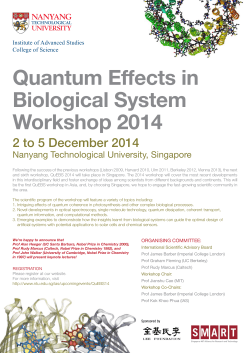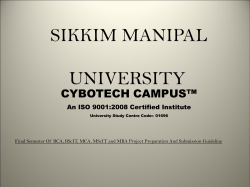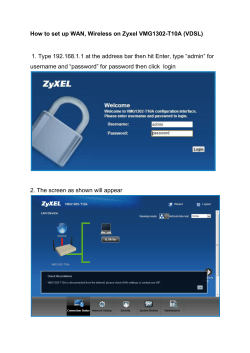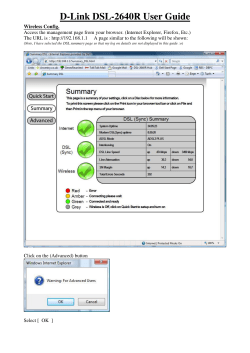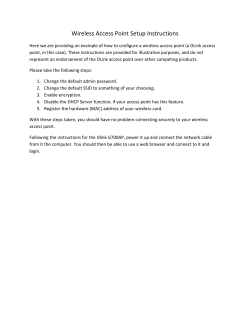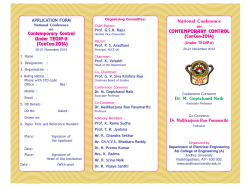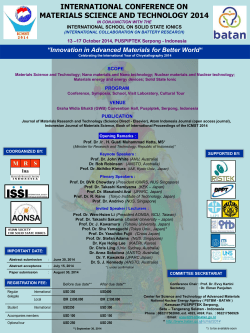
International Conference on Electrical, Electronics and Computer Engineering (ICEECE) 23rd November, 2014
International Conference on Electrical, Electronics and Computer Engineering (ICEECE) 23rd November, 2014 Mumbai, India The Institute For Research and Development India (IRD India) is pleased to organize the 2014 International Conference on Electrical, Electronics and Computer Engineering (ICEECE). ICEECS is a comprehensive conference covering all the various topics of Electrical Electronics and Computer Sciences. The aim of the ICEECS 2014 is to gather scholars from all over the world to present advances in the aforementioned fields and to foster an environment conducive to exchanging ideas and information. This conference will also provide a golden opportunity to develop new collaborations and meet experts on the fundamentals, applications, and products of Electrical, Electronics, Computer, and Information Systems. We believe inclusive and wide-ranging conferences such as ICEECS can have significant impacts by bringing together experts from the different and often separated fields of Electrical, Electronics, Computer, and Information Systems, creating unique opportunities for collaborations and shaping new ideas for experts and researchers. Objectives of Conference The objective of the conference is to provide a platform for academicians and practitioners who are involved in research in the field of Computer Science and Electronics and Communication Engineering to contribute and to disseminate the innovative and important new work. The Conference provides a leading forum for sharing the original research contributions and practical development experiences among researchers and application developers. Theme of the Conference The theme stresses on bridging of all communities of experts for improving research and innovation and sustaining knowledge for the betterment of humanity. The aim of the International Conference on Computational Methods and Experiments in Materials Characterization is to facilitate such interdisciplinary interactions within the research community. Call for Paper Topics of interest for submission include, but are not limited to: Electrical Engineering Techniques of laser and applications of electro-optics Analysis of power quality and system stability Wind Power Generation Battery Management System Circuits and Electronics Electronics Engineering Computer Relaying 3D Semiconductor Device Technology Electric Energy Processing Adaptive Signal Processing Electromagnetic and Photonics Advanced Electromagnetics Electro-optical phenomena of semiconductors and Characterization of High-frequency Properties of techniques of photoelectron Devices Integrated optics and electro-optics devices Component Technology of MEMS Microwave and millimeter circuit and antenna Compound Semiconductor Physics and Devices Power Electronics Device Electronics for I.C Power IC Computer Science and Information Engineering Remote control and techniques of GPS AI and Computational Intelligence Solar Power Generation Algorithms Communications and Control Computer Security Computer structure Computational Theory Embedded Systems High-Performance Computing Internet and multimedia systems Encoding programs of parallel algorithm and vectors Fault tolerance and computation theories Database and Data Mining Mobile Computing Network Security and Cryptography Multimedia Networking Mobile Wireless Networks Wireless Sensor Network Network Simulation and Modeling Embedded system VLSI and CAD/CAM Photonics and Optoelectronics Biophotonics Characteristic analysis of semiconductor materials Coherent wave-like nature Electrodynamics Entanglement Geometrical Optics Holography Intrinsic spin Liquid Crystal Displays Nano-Photonics Technology Optical Fiber Communication and System Photonics Physical Optics Polarization measurement Quantum mechanics Semiconductor Laser Synchrotron Radiation TFT LCD Panel design Tunneling Valence-band offset (VBO) Biomedical Electronics and Bioinformatics Bio-Chips Bio-Photonics Circulatory-systemed creature physics and nerve theories Digital Signal Processing, DSP Magnetic Resonance Imaging, MRI Micro-bending optical fiber sensors Neuroimaging Noninvasive electronic meter of blood-sugar and blood-oxygen Systems of interface between handicapped and computers Ultrasound Communication Engineering Adaptive Signal Processing Antennas and Propagation Applied Electromagnetics CDMA System and RF Engineering Computational Electromagnetics Computer Simulation Content Delivery over Wireless Network Detection and Estimation Electromagnetic Fields in Optoelectronics Fourier Transform and Fourier Optics Mathematical Physics Microwave Engineering Mobile Communications Multimedia networking Multirate Signal Processing Object-Oriented Programming Optical Communication Systems RF Microwave Wireless Systems Transmission-Line Modes and Microwave Circuits Video Signal Processing Wireless or Mobile Communication & Computing CDMA, TDMA and FDMA air interface Cross-layer design Game theory in wireless networks Green pervasive computing Mobile social networking OFDM, OFDMA QoE in wireless systems Smart antennasm UMTS and LTE White-space Wi-Fi Wi-MaX Wireless access techniques Wireless mesh networks Wireless network coding Wireless peer-to-peer Wireless routing Wireless security Wireless sensor networks Wireless video and multimedia WPANs and WLANs Networking, Communication and Multimedia Advanced Computer Networks Advanced Human Computer Interaction Advanced Operating System Artificial Intelligence Computer Graphics Computer Vision Digital Image Processing Digital Image Synthesis Digital Visual Effects Information Retrieval and Extraction Information Theory and Coding Techniques Information Theory and Coding Techniques Internet Telephony Medical Image Processing Mobile Phone Programming Multimedia Analysis and Indexing Multimedia Security Multimedium Computing Environment Pattern Analysis and Classification Performance Modeling Pervasive & Ubiquitous Computing Statistical Methods for Intelligent Information Processing Web Retrieval and Mining Nano-Electro-Mechanical System V solid state electronic devices and electro-optic devices Fabrication Technology of Nanostructures Growth and Device Fabrication of One-Dimensional Materials Introduction to Nanoscience MOS device thin oxide film characteristics Nanomaterials and Nanotechnology Optical and Electronic Properties of Nanomaterials Si detector devices circuit Techniques of molecular beam epitaxy Transport in Nanostructure Editorial Board Chairman Prof(Dr) R. K. Pongiannan Prof. and Head RVS College of Engineering and Technology Coimbatore, India General Co-chairman Dr. K.C. Gouda Sr. Scientist in CSIR Mathematical Modelling and Computer Simulation Bangalore, India International Advisory Committee Prof. A.Cagatay Talay ,Istanbul Technical University,Turky Prof. P. K. Sahoo.,Vanung University,Taiwan Prof. Prabir Patra, University of Bridgeport, USA Prof. Fernandez de Canete, University of Malaga, Spain Prof. Arun Somani, Iowa State University, USA Prof. Tritt Charles S, Milwaukee School of Engineering, USA Prof. Ahmad Taher Azar, IGI-Global, USA Prof. Zakaria Maamar, Zayed University, Dubai Prof. Ramkumar. R, Oklahama State University, USA Prof. Enrico M. Staderini, HEIG-VD, Yverdon, Switzerland Prof. Truong Dinh Chau, Ho Chi Minh City University of Technology, Vietnam Prof. Yu Tang, National University of Mexico, USA Prof. Andrei E. Gorodetsky, Russian Academy of Sciences, Russia Prof. Bharathwaj "Bart Simpson" Muthuswamy,Milwaukee School of Engineering, USA Prof. Valentina E. Balas, Aurel Vlaicu University of Arad, Romania Prof. Xinheng Wang, Institute of Advanced Telecommunications, UK Registration Information Once Your paper is accepted the registration process begins. you have to complete the following four steps... Step1 - Registration Fee It is mandatory for at least one author of an accepted paper to register in order for the paper to appear in the proceedings and included in the Technical Program. Category Academician/Practitioner PhD Scholars / M.Tech / (Any Post Graduate Students) B.Tech Student Indian INR 5000 INR 4000 INR 3000 International USD 250 USD 200 USD 150 Step2 - Registration Form All authors have to sign the Registration Form, which is in Doc format. Click Here to Download Registration Form Step 3 - Camera Ready Paper submission All the paper must be in IEEE double column guidelines and must be submitted as Microsoft word DOC or DOCX format. IEEE guidelines are available at Paper Submission Webpage. Step 4 - Registration After Registration, Please Send the Registration Form & Transaction Details (such as Photo Copy or Scan Copy of Transaction Slip / Bank Statement / Online Payment Details) along with Enrollment No. by Email (mumbai.two.ird@gmail.com) or by Speed Post Only. Important Dates Paper should be in the format strictly specified on the conference website. Only the selected papers will get the intimation that will be accepted for publication. Kindly do not submit the paper multiple times; it may lead to cancellation of an article/paper. Last Date of Paper Submission: Notification of Acceptance: Last Date of Registration: Date of Conference: 5th November, 2014 5th November, 2014 10th November, 2014 23rd November, 2014 Publication Guidelines All registered papers of the conference will be published in the conference proceeding having the ISBN number: 978-81-31703-83-2 Venue Hotel Marian International No. 26, Arts College Road, near city judicial court, Behind KG Hospital, Coimbatore, TN 641018 Contact Us Papers for review may be submitted to : mumbai.two.ird@gmail.com
© Copyright 2025

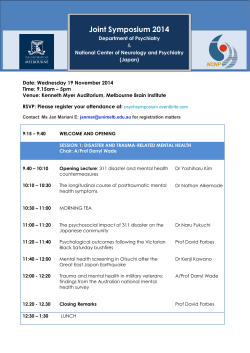
![[WCR-300S] How to Change the Wireless Network Name(SSID)](http://cdn1.abcdocz.com/store/data/000232989_1-c13ffbaf9a88e423608ef46454e68925-250x500.png)
